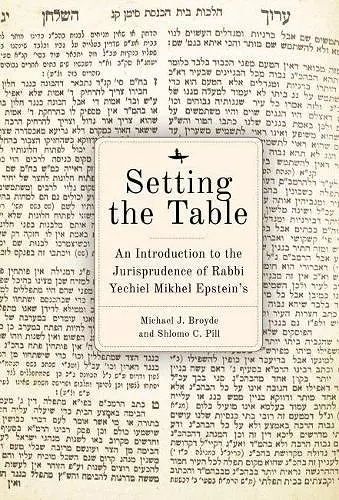Setting the Table
An Introduction to the Jurisprudence of Rabbi Yechiel Mikhel Epstein's Arukh HaShulhan
Michael J Broyde author Shlomo C Pill author
Format:Hardback
Publisher:Academic Studies Press
Published:30th Jan '21
Currently unavailable, and unfortunately no date known when it will be back

One of the most basic questions for any legal system is that of methodology: how one interprets, analyzes, weighs, and applies a mass of often competing legal rules, precedents, practices, customs, and traditions to reach final determinations and practical guidance about the correct legal-prescribed course of action in any given situation. Questions of legal methodology raise not only practical concerns, but theoretical and philosophical ones as well. We expect law to be more than the arbitrary result of a given decision maker's personal preferences, and so we demand that legal methodologies be principled as well as practical. These issues are especially acute in religious legal systems, where the stakes are raised by concerns for respecting not just human, but divine law. Despite this, the major scholars and codifiers of halakhah, or Jewish law, have only rarely explicated their own methods for reaching principled legal decisions. This book explains the major jurisprudential factors driving the halakhic jurisprudence of Rabbi Yehiel Mikhel Epstein, twentieth-century author of the Arukh Hashulchan-the most comprehensive, seminal, and original modern restatement of Jewish law since Maimonides. Reasoning inductively from a broad review of hundreds of rulings from the Orach Chaim section of the Arukh Hashulchan, the book teases out and explicates ten core halakhic principles that animate Rabbi Epstein's halakhic decision-making. Along the way, it compares the Arukh Hashulchan methodology to that of the Mishna Berura. This book will help any reader understand important methodological issues in both Jewish and general jurisprudence.
“Broyde and Pill’s book is an immensely informative and illuminating read. By taking a traditional jurist seriously as a legal writer and thinker, they have done a real service, especially to the academic communities of Jewish studies and jurisprudence. If it can help bring these, and other similarly inclined constituencies, into conversation, their work has done more than enough.”
— Joshua Schwartz, University of Toronto Faculty of Law, Reading Religion
“Since the Bible, there are three codes that can lay claim to covering the gamut of Jewish law, including laws whose relevance is dependent on the existence of a Temple in Jerusalem: The third-century redaction of the oral tradition Mishna, Maimonides’s twelfth-century magnum opus Mishne torah, and the comprehensive code penned by Rabbi Yehiel Mikhel Halevi Epstein (1829–1908). … Of the three codes, Epstein’s writings have attracted the least attention… In light of the paucity of research on Epstein’s code, Michael J. Broyde and Shlomo C. Pill have made a significant contribution with their volume Setting the Table. Setting the Table complements other recent efforts to recount Epstein’s biography, explore his literary oeuvre, and plumb his legal writings.”
— Levi Cooper, Journal of Law and Religion
“In this fascinating work, Broyde and Pill … bring to life the intellectual choices made by the Arukh Hashulkhan, situating their work within the long history of attempts to codify Jewish law. … This is an invaluable contribution to our understanding of rabbinic jurisprudence.”
—Suzanne Last Stone, Professor of Law, Cardozo Law School, University Professor of Jewish Law and Contemporary Civilization, Yeshiva University
“Rabbis Broyde and Pill not only analyze the principles used by the author, but they systematically demonstrate how they were applied to specific laws. This work is … valuable both to the outsider and the Talmudic scholar.”
—Rabbi Yosef Blau, Senior Mashgiach Ruchani and Rosh Yeshiva, Rabbi Isaac Elchanan Theological Seminary“Too often, discussions of halakhic methodology proceed from a few high-profile examples. In this exciting new book, Rabbis Broyde and Pill offer an account of how one of the most important poskim of our era functioned both when the social and religious stakes were high and when they were not. This book not only presents a data-based analysis of the Arukh Hashulchan’s decision making, but a set of tools that can be applied to other works to enhance our understanding of the formation of p’sak more broadly.”
—Chaim Saiman, Professor of Law, Villanova University School of Law & author of Halakha: The Rabbnic Idea of Law (2ISBN: 9781644690703
Dimensions: unknown
Weight: unknown
428 pages